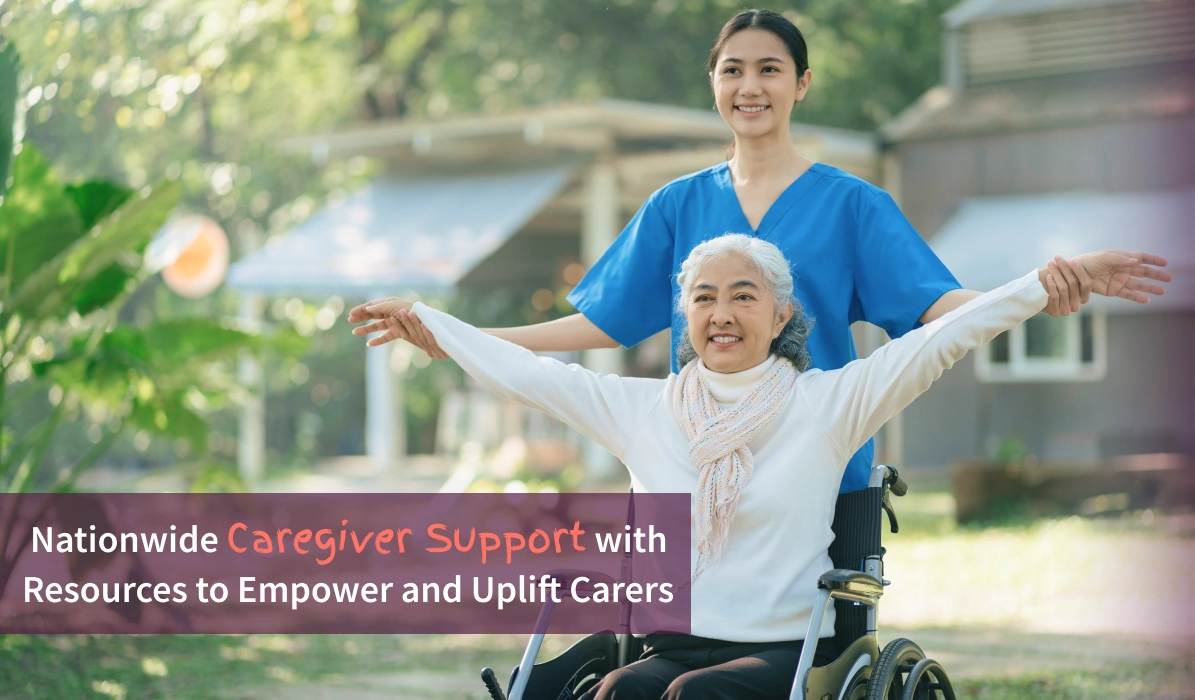
Some of our society's most important unsung stars are people who care for others. Many people help their parents, grandparents, spouses, friends, and coworkers who need help.
It's great to see so many family and friends offer to help seniors and people with special needs as full or part-time caregivers. Balancing caregiving and self-care is crucial for these individuals who often need time to recharge because they give so much to the people they care about.
It's easy for caregivers to get sick or burned out, which can be very bad for them and their lives, as well as those who depend on their love, care, and support. It is crucial to address caregiver mental health to ensure these individuals' well-being.
This article will review the resources and support caregivers need to build resilience in caregiving and empower them in their roles.
Top Resources for Nationwide Caregiver Support
Caregiving isn’t easy. It requires all the support and resources caregivers can get. Here are top resources to support and empower caregivers.

1. Support groups
Through online support groups, caregivers can connect with others who understand their problems. They can find others going through the same things as them, share their stories, help each other, and offer emotional support.
Anyone with an internet link can join these groups, making them useful for caregivers needing more time or mobility.
2. Training programmes
Training programmes for carers help them take better care of their loved ones by providing information and teaching them valuable skills.
These programmes cover topics such as managing medications, personal care skills, speaking abilities, and ways to deal with stress. People who care for others can improve their skills and the level of care they give by taking part in training programmes.
3. Respite care
Respite care services give carers a break by having a professional take care of their loved ones briefly. That way, carers can take a much-needed break from their duties to rest, recharge, and care for their needs.
Depending on the wants and preferences of the carer, respite care can be set up for a few hours, a day, or even more extended periods.
4. Telehealth services
These services let caregivers talk to doctors and nurses from afar to make fewer trips and meetings. Doctors, nurses, therapists, and other health care professionals can talk to caregivers on the phone, through video calls, or secure messaging apps.
Telehealth services let caregivers check in with a doctor, discuss their worries, and care for their loved one's health from home.
5. Financial support
These programmes give carers tools and support to help with the money problems of caring for someone. Giving them money, grants, subsidies, or reimbursement might help pay for medical bills, home changes, transportation, and respite care services for carers.
By using financial aid programmes, carers can get the money they need to keep giving care without worrying about money problems.
This resource series can significantly improve caregivers' lives and the care their loved ones receive as a result of nationwide caregiver support initiatives.
Top Supporting Ways for Nationwide Caregiver Support
1. Spend time to communicate
Time constraints often make it hard for caregivers to interact closely with patients in busy healthcare settings. Administrators can prioritise this by creating rules that give guardians set times to talk to each other privately.
Caregivers can spend more time with patients by planning for shorter patient loads or adding extra time to rounds. This lets them talk, listen, and build relationships with patients, leading to trust and emotional support.
2. Encourage team working
Caregivers need to be able to talk to their patients well to understand their specific wants and preferences. Managers can set up ways for workers to speak to patients, their families, and other healthcare team members so that they are more likely to do so regularly.
Platforms like patient rounding systems let caregivers share valuable data, insights, and patient preferences. This enables caregivers to change how they do things and give better, more personalised care.
3. Give them a break
As was already said, caring for someone can be very tiring. A new study shows that 40% of caregivers are mentally stressed, and 20% are physically stressed. Helping parents start by giving them time off to care for themselves is a good place to start. If you can, offer to hold down the fort for a day.
Another option is to hire a private nurse for a few hours. They would appreciate it if you could do anything to give them a break. Need help choosing a respite care service provider? Care Assure offers respite care so that caregivers can take a well-deserved break while their loved one is cared for by trusted professionals.
4. Help set boundaries
Many caregivers spend more time, energy, and money than they planned on taking care of their loved ones. Some are so dedicated to the person they care for that they refuse to put anything else first. This quickly makes them feel stressed, overloaded and even burned out.
You can help the person caring for you by assisting them to set limits to keep themselves safe. Sometimes, a caregiver needs someone else to tell them how much their work hurts their health.
Remember that they can't properly care for their loved one if they don't care for themselves first, even if they love that person very much.
5. Check up on them
A caregiver will appreciate it most if you check in on them occasionally. Many guardians don't want to talk about their problems with others, even when they're having a hard time. Checking in on them occasionally might be the difference between caregivers giving up and asking for help.
6. Put them in a support group
No matter how much you help the caregiver, sometimes it may be too much to handle alone. After all, you have your own life to go on. However, if several family members or friends take turns helping the caregiver, help is more likely to be there when needed.
7. Help with some tasks
Many caregivers are already overwhelmed with their duties. Kindness can go a long way. Provide daily assistance, such as cooking, cleaning, or running errands.
You can provide relief by bringing them a home-cooked meal or walking their dog. It is important to remember that caregivers may hesitate to ask for help. To ease their burden, be proactive and offer specific assistance.
Nationwide caregiver support initiatives, including simple acts of kindness, can significantly impact caregivers' lives. By recognising and addressing their needs, we can empower caregivers and ensure the well-being of both caregivers and care recipients.

Conclusion
Giving care requires love, strength, and dedication, as we often have to put someone else's health ahead of our own. Even though being a carer can be challenging, it's important to remember the significant difference it makes in the lives of those you care for.
It's important to remember that carers are never alone, even if their job is hard. Carers can get the strength and balance they need to put their health first by recognising the signs of burnout, asking for help, and making the most of the resources.
Care Assure is a great provider for carers and patients in South Australia. We ensure that patients and carers get the best care without leaving their homes. We offer basic medical care, specialised memory care, and in-home physical therapy.
Frequently Asked Questions
What are caregiver resources for individuals with disabilities?
Caregiver support resources for individuals with disabilities encompass a variety of services and programs designed to assist caregivers in their unique caregiving journey. These resources provide practical assistance, emotional support, and specialised guidance to help caregivers more effectively navigate the challenges of caring for someone with disabilities.
Who can benefit from caregiver support?
Caregiver support is available to anyone providing care to a person with a disability, regardless of the type or severity of the disability. Whether you are a family caregiver, a professional caregiver, or a friend providing support, these resources are tailored to meet the specific needs of caregivers in this context.
What types of support are available for caregivers?
Caregiver resources offer a wide range of support services, including specialised training programs, assistive technology resources, respite care services, financial assistance programs, and access to disability-specific healthcare professionals. These resources aim to address the unique challenges of caregivers of individuals with disabilities and provide them with the tools and support they need to enhance their caregiving experience.
How can I access caregiver support resources?
Caregiver support resources can be accessed through various channels, including disability advocacy organisations, government agencies, healthcare providers specialising in disabilities, community centres, and online platforms dedicated to disability support. Many resources are available online, allowing caregivers to access them conveniently from their homes.
Are caregiver support resources free to use?
Many caregiver support resources for individuals with disabilities are offered free of charge or at a low cost to caregivers. However, some services or programs may have associated fees or eligibility requirements. Researching and inquiring about the price and availability of specific resources is essential before accessing them.
How do I know which caregiver support resources are right for me as a caregiver?
The right caregiver support resources for you as a caregiver of an individual with disabilities will depend on your unique needs, preferences, and circumstances. It's helpful to explore different options, such as online research, speaking with disability support organisations, consulting with healthcare professionals specialising in disabilities, and seeking recommendations from other caregivers in similar situations.








